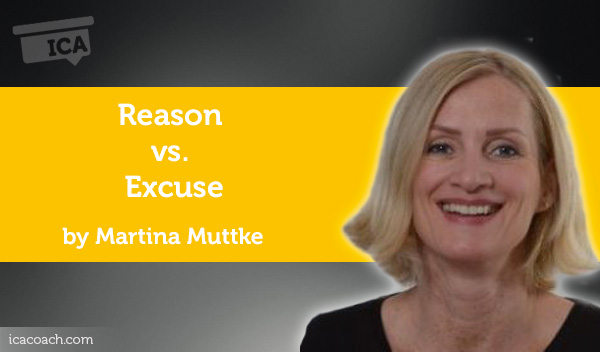
A Coaching Power Tool Created by Martina Muttke
(Executive Coach, SWITZERLAND)
I attribute my success to this—I never gave or took any excuse.—Florence Nightingale
Giving reasons, that are in truth excuses, is not only a bad habit, but has become part of how our society interacts. People give reasons for shortcomings, forgetfulness, for being late, for not showing up. Truth is, we may come up with these reasons because we are trying to be polite, but in reality it is because we do not care.
If we are invited to spend a weekend with some friends we never really liked, we easily will find a valid reason (or so we believe), to excuse ourselves. If we are being asked for a favour we don’t want to do, we react in the same way. In both cases, if we would CARE, we would do anything possible to make the weekend work, to help the person who asked us for a favour.
We can always come up with excuses for why we do things- or why we don’t do them. If we want other people to be honest with us, shouldn’t we start by respecting others enough to be mindful but honest with them?
Excuses allow us to remain in our comfort zone, escape potential conflicts by avoiding honesty, avoid to take responsibility for our actions.
As Professor Bernard Roth from Stanford explains, we should live our life as reason free as possible: “a good reason is a great B.S.!”
The Difference Between a Reason and an Excuse: There isn’t any.
Giving a reason for a behavior is often indeed just providing an excuse. We will always find a million of reasons for our behavior, but if we start caring, we will not need to give reasons: instead we will slowly start changing our behavior and become more truthful to ourselves.
If we are motivated to tell others the truth out of respect for them, doesn’t it make sense to show ourselves the same degree of respect? To tell that we can’t do something, when the truth is we just don’t want to do it, is not being in line with our own values for honesty. Our inner self will recognize the difference between giving an honest answer and making excuses that are not in line with reality. We sense that as a betrayal on our-self.
Self-reflection:
Learning how to respond with mindful honesty
There are a couple of steps to take in order to become more honest with ourselves, whilst improving our respectful behavior towards others:
Reflection:
Which kind of “replacements phrases” you might consider, in order to avoid the excuse “I can’t”?
All of these phrases clearly state our intention without being dishonest or covering up the truth. We can be honest without being rude or thoughtless. It is the other way around: being honest and mindful at the same time is a more sincere, more respectful way to respond.
Case Study- Erika’s Example:
The character portrayed in this case study has been given a fictitious name so as to respect confidentiality and to protect the dignity and identity of the individual concerned.
Erika is being asked by a former colleague to accompany her to a meeting next week, where she believes Erika can help make acquaintances that will support her to find a new job. Erika always thought that this former colleague was quite selfish. She never invested energy herself in making her live better, but used the reputation and skills of other people to her advantage.
Erika excuses herself by reasoning that she agreed to drive her kid to a football game, and that she will need to stay there the whole afternoon.
In truth the situation was quite different: there was a football game, but a friend already offered to take her kid together with his own, and to stay with the kids during the game. Erika was actually planning to finally have a haircut and some shopping done during that time. She was looking forward to these couple of hours for herself.
The options for Erika’s answer would have been mannifold:
By choosing to give, what Erika believes is a a “socially acceptable” reason, and in order to not create disappointment, she is shifting the responsibility and the blame about the situation to some external, factious circumstance.
Erika, who had full control over the situation, chose the easy way out. She did not only lie to her colleague, but to herself: she declined and belittled her wish for her own beauty afternoon, and indeed chose giving an excuse instead of a truth.
The situation shows how little Erika cares about two things: her colleagues situation, but also her own wishes. She protects her self-image by blaming fate and escaping ownership of her wishes and priorities.
Self Application:
Examine your own excuses. Create a list of the excuses you make, consider why you make them. Then decide which ones you want to stop making, and what are possible answers to replace them with.
Understand how your “reasons” (=excuses) happen. Excuses are often made to shift blame away to circumstances beyond our control.
The first steps to stopping making excuses is to examine:
Coaching application:
Reflections:
Question:”What is important for you?” “What do you really want?” “What keeps you from telling how you feel?” “What does being honest mean for you?”
Mirror back: “How would you feel to discover that someone you ask for a favour tells you an excuse that is covering up their true feelings?”
References:
Reframing Problems and Getting Honest
Podcast, Bernard Roth, Stanford University
Blog: advanced lifeskills.com; What’s the Value of Knowing Your Core Values?